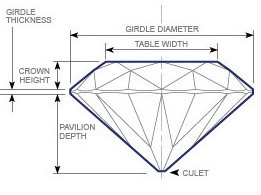|
Terminology: The parts of a diamond
When checking diamond quality or any of the Four Cs, you may come across terms that are puzzling. What, for example, has a diamond got to do with a table? Isn’t ‘crown’ where a diamond belongs rather than a specification? What on earth does a diamond have to do with a ‘pavilion’ or a ‘girdle’? Here’s an easy-to-understand guide on what all those bewildering terms mean.
Table: The uppermost flat facet of the diamond Table width: The width of the table Crown: The sloping portion on the upper half of the diamond that angles away from the table Pavilion: The lower portion, or lower half of the diamond that slopes toward the base Girdle: The narrow rim that separates the crown from the pavilion. It measures the widest part of the diamond Culet: The tiny facet on the pointed bottom of the pavilion, which is the portion of a cut gem below the girdle Facets: the smooth, polished planes that make up the surface of the diamond (there should be at least 58 facets) Crown Angle: The degree of slope between the table and the girdle Crown Depth: The vertical height between the table and the girdle Pavilion Angle: The degree of slope between the girdle and the culet Pavilion Depth: The vertical height between the girdle and the culet Diameter /Girdle Diameter: The width of a diamond, measured through the girdle Depth: The height of a diamond, from the table to the culet When you are familiar with the terminology that describes the various parts of a diamond, you can avoid common cutting flaws, such as a thicker girdle, a sloping table, or too few facets, or a poor cut. All these flaws affect the reflection of light from the diamond and the overall appearance of the stone. Useful tip The cut and shape of each diamond requires different proportions for the best appearance. If you have decided on the shape you want, be sure to investigate the specific dimensions, called ‘ideal proportions’, for that shape.
Loose Diamonds Home Diamond Basics Standard Cuts Fancy Cuts Bargain Buys Buying Guide
|





